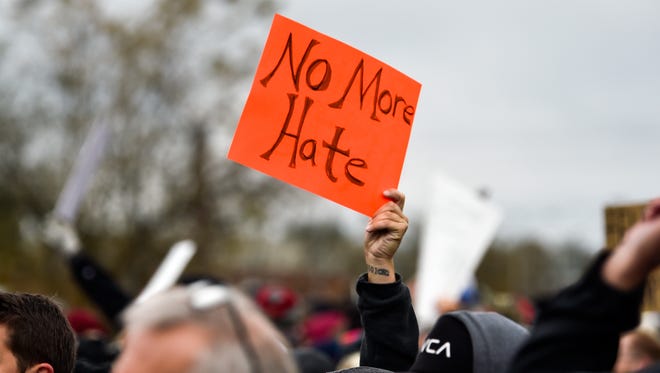
In a culture increasingly sensitive to the use of certain inflammatory words, one word is still often used in everyday conversation and political discourse – despite being arguably the most inflammatory four-letter term in the language. That word is hate.
All of us, it’s safe to assume, have casually invoked this epithet in many contexts. “I hate snow.” “I hate seafood.” “I hate staff meetings.” The charge escalates when directed against particular human organizations or individuals. “I hate hip-hop.” “I hate Big Oil.” “I hate Donald Trump.” “I hate Justin Trudeau.” On a personal level, nothing is more damaging to a relationship than the fatal utterance “I hate you”; in fact it’s rarely spoken to the same person without a prior declaration of “I love you,” which is why it’s so powerful. We say hate all the time, but what does it mean to truly feel it?
Today we have legal definitions of “hate crimes,” “hate speech,” and “hate groups,” and many held positions on a range of social issues are condemned as mere “hate,” as in the offhand putdown “Haters gonna hate.” Yet insofar as the word is defined as “viseral hostility” or “all-consuming antagonism,” it frequently seems misapplied. Someone who spray-paints a swastika on a synagogue or a mosque may well be motivated by abject hate, although ignorance, impulsiveness, mental illness or even intoxication could be other factors. A complex piece of legislation, however, or a public lecture or a nonfiction book on a controversial topic – carefully crafted language deployed in the service of selected ideas – are too dispassionate to really be characterized as hate. Such things may be perceived as offensive or objectionable, by some who read or hear them, but that isn’t the same as knowing the deepest psychological drives of their authors.
Likewise, private groups that purport to defend Christianity, the traditional family, or men’s rights are sometimes accused of fomenting hate against outsiders, but they usually reject the allegation – promoting one thing, they’ll say, isn’t necessarily equivalent to denigrating another. Disagreement is not hate. Doubt is not hate. Disinterest is definitely not hate. Yet they’ve all been called so by critics, when the disagreement, doubt, or disinterest originate with an ideologically suspect party. One person’s reasonable argument is another’s blasphemy, or another’s obscenity, or another’s hate. “Hate” is a very general description leveled against a lot of very different attitudes. “Hate” makes no distinction between murderous rage and a social media post.
In his 2020 book The New Class War, Michael Lind distinguished several separate outlooks which are commonly lumped together:
A disturbed young man who is driven by internal compulsions to harrass and assault gay men is obviously different from a learned Orthodox Jewish rabbi who is kind to lesbians and gay men as individuals but opposes homosexuality, along with adultery, premarital sex, and masturbation, on theological grounds – but both are “homophobes.” A racist who opposes large-scale immigration because of its threat to the supposed ethnic purity of the national majority is obviously different from a non-racist trade unionist who thinks that immigrant numbers should be reduced to create tighter labor markets to the benefit of workers – but both are “xenophobes.” A Christian fundamentalist who believes that Muslims are infidels who will go to hell is obviously different from an atheist who believes that all religion is false – but both are “Islamophobes.”
Similar conflations of reflection and reaction are now categorized under the single umbrella of “hate.” This is a cheap and demeaning label to throw about so glibly, and unwarranted designations of it will only inspire the real thing. There’s been more than enough genuine, homicidal hate in the world for several thousand years. Let’s not add to that by dragging in other feelings which don’t meet the criteria, and which don’t do the damage.
